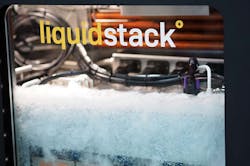LiquidStack Gets Investment from Trane to Advance Immersion Cooling
Immersion cooling specialist LiquidStack has received an investment from Trane Technologies, the global HVAC giant, the companies said today. Details of the Series B funding were not disclosed, but LiquidStack CEO Joe Capes said the investment will be "significant" for his company's development.
LiquidStack was created as a liquid cooling unit inside The Bitfury Group, a crypto mining company. In 2021 LiquidStack was spun out as a stand-alone company with $10 million in Series A funding from hyperscale hardware maker Wiwynn, and ambitions to address growing cooling challenges in cloud data centers and high-performance computing (HPC).
The investment from Trane will advance that goal, enabling LiquidStack to build a manufacturing facility and R&D lab in the United States. More importantly, said Capes, it serves as a vote of confidence from a marquee player in data center cooling.
"This represents a milestone in the liquid cooling industry to see one of the big brands in our industry really stepping up to invest and participate in this really fast-growing market," said Capes. "Trane is a very well known company and is the industry leader in HVAC and sustainability."
Trane Brings Sustainability Focus
The partnership with Trane can boost LiquidStack's market position among a group of cooling startups seeking to capitalize on the growing adoption of artificial intelligence (AI) and other high-density applications, which pose challenges for data center design and management. Powerful new hardware for AI workloads is packing more computing power into each piece of equipment, boosting the power density – the amount of electricity used by servers and storage in a rack or cabinet – and the accompanying heat.
Trane Technologies was formed in 2020 and includes the Trane and Thermo King brands. The company's manufacturing heritage dates to 1885 but is now focused on refrigeration and HVAC products that can improve the sustainability of its customers' operations.
"LiquidStack’s unique immersion cooling technology ... is raising the bar for sustainable data center cooling," said Amber Mulligan, vice president, Strategic Sales and Marketing, Commercial HVAC Americas, Trane Technologies. "Immersion cooling solutions will also help achieve our bold Sustainability Commitments, which includes reducing one billion metric tons of carbon emissions from our customers’ footprint by 2030 and achieving net-zero emissions by 2050.”
Immersion cooling can deliver exceptional power efficiency because it uses sealed tanks that don’t require the raised floors or room-level air cooling found in most commercial data centers. LiquidStack specializes in two-phase immersion cooling, in which servers are immersed in a coolant fluid that boils off as the chips generate heat, removing the heat as it changes from liquid to vapor. The vapor then condenses into liquid for reuse, all without a pump. This allows some LiquidStack implementations to deliver partial PUE (Power Usage Effectiveness) ratings as low as 1.02 to 1.03.
Coolant Fluids Under Scrutiny
LiquidStack's new U.S facility will include manufacturing and a lab for research, including R&D on advanced dielectric fluids that can reduce both global warming and ozone depletion, which have both been historic challenges in the cooling sector.
In December, 3M said it would stop making products that include PFAs (polyflouroalkyl substances), manufactured chemicals which are suspected carcinogens and are known as "forever chemicals" because they break down slowly and can accumulate in the environment, including drinking water. The 3M products being discontinued include Novec, a fluid used in two-phase immersion cooling.
"There's definitely been more scrutiny on the use of PFAs in fluids," said Capes. "We have customers that still use Novec, and this has prompted some of them to pivot to other low GWP (global warming potential) fluids that are showing more promise."
Capes noted that a number of newer fluids being used by customers offer better performance and climate profile, including ones from Honeywell. Last year Cargill introduced NatureCool, a plant-based, biodegradable cooling fluid. During this transition for two-phase coolants, sustainability will be among the key variables for data center users in weighing competing high-density solutions.
The surging interest in generative AI appears likely to prompt more interest in density, and Capes says the opportunity extends beyond the hyperscalers and HPC users.
"We thought colos (multi-tenant providers) were going to be a laggard in this market," said Capes. "But we're seeing a lot of interest in the colocation space around two-phase immersion cooling, along with other (high-density) approaches. We think a lot of that has to do with the fact that the industry as a whole really needs to consider how to future proof facilities, whether they're brownfield existing sites or new builds, to accommodate the inevitability of direct-to-chip and immersion cooling."
About the Author



